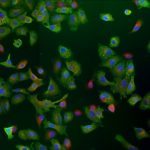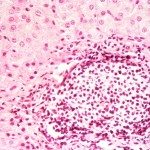Link to Pubmed [PMID] – 22013034
J. Virol. 2012 Jan;86(1):584-8
A deletion of ∼20 amino acids in the stalk of neuraminidase is frequently observed upon transmission of influenza A viruses from waterfowl to domestic poultry. A pair of recombinant H7N1 viruses bearing either a short- or long-stalk neuraminidase was genetically engineered. Inoculation of the long-stalk-neuraminidase virus resulted in a higher cloacal excretion in ducks and led conversely to lower-level oropharyngeal excretion in chickens, associated with a higher-level local immune response and better survival. Therefore, a short-stalk neuraminidase is a determinant of viral adaptation and virulence in chickens but is detrimental to virus replication and shedding in ducks.


